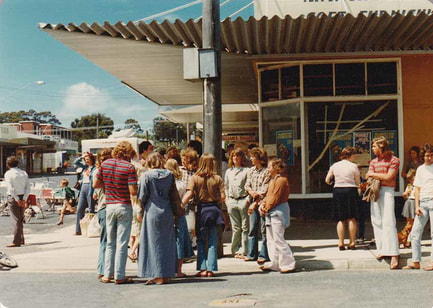 Bonds corner, looking south on McBride Avenue, Wonthaggi, on a Saturday morning in the early 1970s. The Wonthaggi Citizens Band has been performing. Photo: Frank Coldebella
Bonds corner, looking south on McBride Avenue, Wonthaggi, on a Saturday morning in the early 1970s. The Wonthaggi Citizens Band has been performing. Photo: Frank Coldebella FOR thousands of years, the north-facing slope of what we now call McBride Avenue would have been an ideal meeting place for local Aboriginal people, with a wetland at the bottom and an abundance of plant and animal food within in easy walking distance.
For most of the 1900s, McBride Avenue was still a meeting place, particularly on Friday night (late night shopping) and Saturday morning (when the shops closed at noon at the sound of the hooter). In a pre-digital version of FaceTime, two people would stop to chat; others would join in, some would leave, more would join.
Wonthaggi has recently been identified as a peri-urban centre with huge growth predictions.
How do we preserve its small-town culture, pace, heart and soul as the imperatives of growth and commerce trickle down?
For some years now the idea of removing traffic from the northern end of McBride Avenue and using the space for something better has been talked around.
With support from the council, the street was closed off with pallets and bales over the September long weekend to create a mall. An assortment of local musicians and singers performed despite the cold wind. A passing child stopped to play Old MacDonald Had a Farm on an old donated piano placed near the Whalebone Hotel, to the delight of her grandparents and the smiles of onlookers.
The two-day trial was used to gather opinions and ideas and instigate numerous discussions. Germans have platze, the French have places, the Italians piazzas. What would a Wonthaggi version of such a space look like? It’s hard for a small group to conceptualise. These things need lots of input, time to grow and flexibility to evolve.
Public land should be used for community benefit. How do we create a space and atmosphere where a three-year-old and a 93-year-old and those in between can hang out and interact at various times?
Imagine a breathing space where aromatic plants waft over the bitumen and cement, where melodic acoustic tunes drown the noise of traffic, a place to pause and recharge.
Imagine a restful oasis at the heart of town, a balanced mix of art and music, a place where people who would never visit an art gallery or a concert hall get to see works and hear arias they didn’t know existed.
Watching the school choir, band or dance performance can make a grandparent’s day out.
In the days before permits and insurance were required, I remember groups of school kids playing in front of the Whistle Stop Café on Friday afternoons. Sam Allen remembers playing guitar there as a 10-year-old. “We had a passionate music teacher … it was a great time playing grasshopper blues with schoolmates.” Sam still plays guitar today.
Buskers, singers, musicians, jugglers, dancers, pavement artists are free traders, brave flowers that appear in the hard cracked concrete of commerce. They entertain us, slow our pace and side-track us. No wonder they get moved on from private shopping spaces.
“Busking is one of the most valuable experiences a musician can have,” master violinist Rupert Guenther said. “It’s about opening people’s hearts.”
An impoverished teenager with a brave heart can earn enough in a half hour of busking for a meal. In Europe some local councils pay buskers and it is standing room only.
Elijah Gemmel started busking acoustic guitar in Wonthaggi aged 14. Apart from being moved on from outside the Wonthaggi plaza, he found people “very welcoming, polite, respectful and supportive”.
Wonthaggi’s sense of identity has its roots in a co-operative inclusive camp that welcomed newcomers and their ideas. In the tradition of the miners’ camps, seating and plants should be portable to cater for the various activities of organisations and clubs.
The public art in this space could depict insights and collective achievements and encourage the search for ideas that lead to a more civil society.
A mixture of creative arts leads to cross pollination of ideas and give new perspectives. In this atmosphere, serendipitous meetings prompt discussions and increase our social capital.
A few years ago an elderly woman out shopping stopped to soothe and reassure a crying infant in a pram. When the child’s parent arrived, the woman was surprised to find that the infant was one of her many great grandchildren.